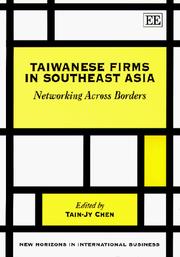| Listing 1 - 8 of 8 |
Sort by
|
Book
Year: 2003 Publisher: Cambridge, Mass. National Bureau of Economic Research
Abstract | Keywords | Export | Availability | Bookmark
 Loading...
Loading...Choose an application
- Reference Manager
- EndNote
- RefWorks (Direct export to RefWorks)
Book
Year: 1995 Publisher: Cambridge, Mass. National Bureau of Economic Research
Abstract | Keywords | Export | Availability | Bookmark
 Loading...
Loading...Choose an application
- Reference Manager
- EndNote
- RefWorks (Direct export to RefWorks)

ISBN: 1858987466 Year: 1998 Publisher: Cheltenham Elgar
Abstract | Keywords | Export | Availability | Bookmark
 Loading...
Loading...Choose an application
- Reference Manager
- EndNote
- RefWorks (Direct export to RefWorks)
Digital
Year: 1995 Publisher: Cambridge, Mass. National Bureau of Economic Research
Abstract | Keywords | Export | Availability | Bookmark
 Loading...
Loading...Choose an application
- Reference Manager
- EndNote
- RefWorks (Direct export to RefWorks)
Economic relations. Trade --- Taiwan --- United States of America
Digital
Abstract | Keywords | Export | Availability | Bookmark
 Loading...
Loading...Choose an application
- Reference Manager
- EndNote
- RefWorks (Direct export to RefWorks)
Book
Year: 1998 Publisher: Cambridge (Mass.): Harvard institute for international development
Abstract | Keywords | Export | Availability | Bookmark
 Loading...
Loading...Choose an application
- Reference Manager
- EndNote
- RefWorks (Direct export to RefWorks)
Book
Year: 2003 Publisher: Cambridge, Mass. National Bureau of Economic Research
Abstract | Keywords | Export | Availability | Bookmark
 Loading...
Loading...Choose an application
- Reference Manager
- EndNote
- RefWorks (Direct export to RefWorks)
In this paper, we study the effects of FDI on domestic employment by examining the data of Taiwan's manufacturing industry. Treating domestic production and overseas production as two distinctive outputs from a joint production function, we may estimate the effect of overseas production on the demand for domestic labor. We found that overseas production generally reduces the demand for domestic labor as overseas products serve as a substitute for primary inputs in domestic production (substitution effect). But overseas production also allows the investor to expand its domestic output through enhanced competitiveness. The expanded domestic output leads to more employment at home (output effect). The net effect of FDI on domestic employment is a combination of substitution and output effects. For Taiwan, the net effect is positive in most cases but it differs across the labor group. Technical workers tend to benefit most from FDI, followed by managerial workers, and blue-collar workers benefit the least; indeed they may even be adversely affected. This suggests that after FDI, a reconfiguration of division of labor within a firm tend to shift the domestic production toward technology and management intensive operations.
Book
Year: 1995 Publisher: Cambridge, Mass. National Bureau of Economic Research
Abstract | Keywords | Export | Availability | Bookmark
 Loading...
Loading...Choose an application
- Reference Manager
- EndNote
- RefWorks (Direct export to RefWorks)
This paper reviews the history of bilateral trade negotiations between Taiwan and the U.S. The question posed at the outset is: does bilateralism enhance or jeopardize multilateralism? The U.S.-Taiwan experience seems to suggest a grossly negative answer. Bilateral negotiations for market opening with the threat of unilateral trade sanctions (such as Section 301 action) tend to encourage trade preferences and U.S. negotiators are inclined to accept such preferential arrangements in areas where U.S. domestic interests are homogeneous and concentrated. Even in the case of tariff negotiations where any tariff concessions made by Taiwan are extended to other trading partners on an MFN basis, bilateralism does not necessarily enhance multilateral principles. The scope of tariff concessions made by Taiwan shows a strong bias in favor of the sectors in which the U.S. has a comparative advantage in Taiwan's market and the sectors in which U.S. domestic industries exhibit monopoly power. Meanwhile, U.S. commitments to GATT strengthen its position in bilateral negotiations and help persuade Taiwan, which is not a member of GATT, to make similar concessions.
| Listing 1 - 8 of 8 |
Sort by
|

 Search
Search Feedback
Feedback About UniCat
About UniCat  Help
Help News
News